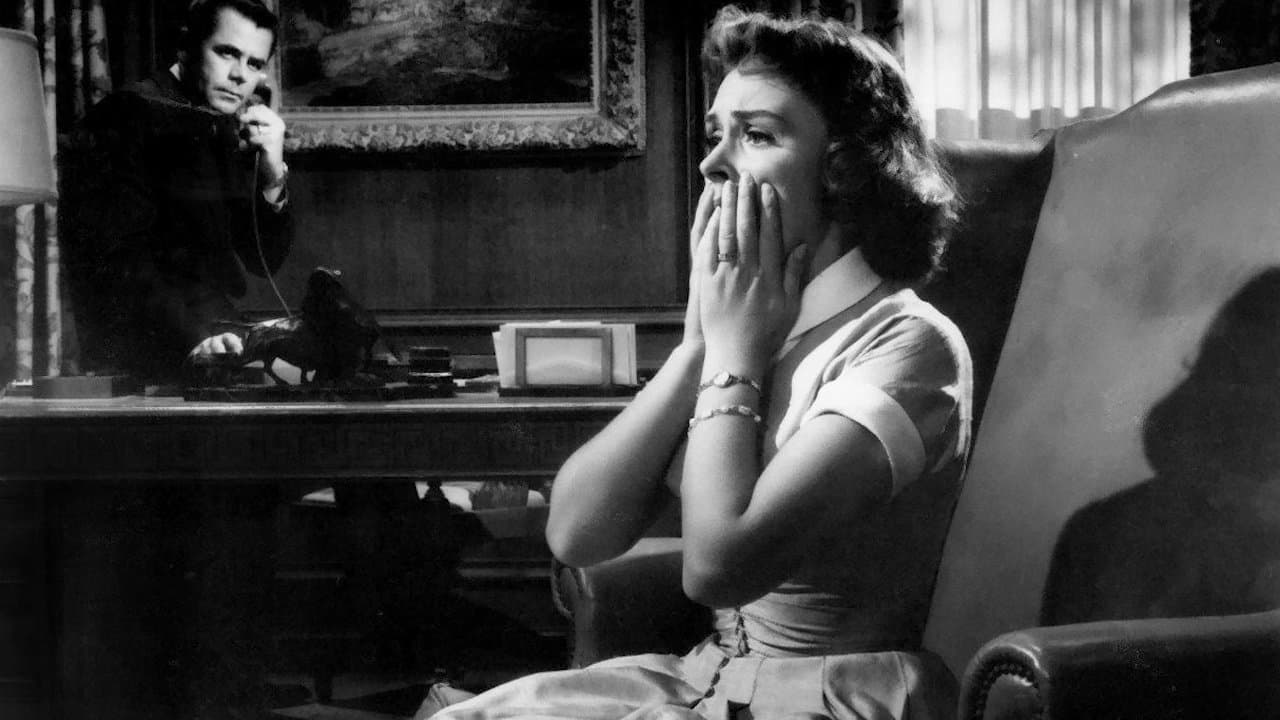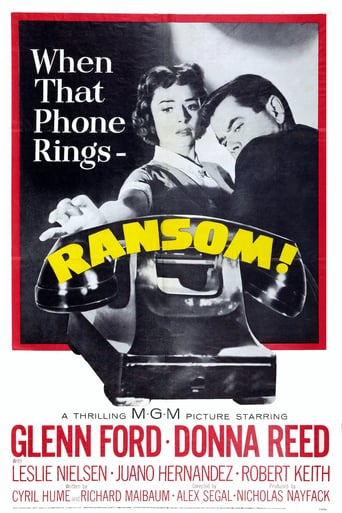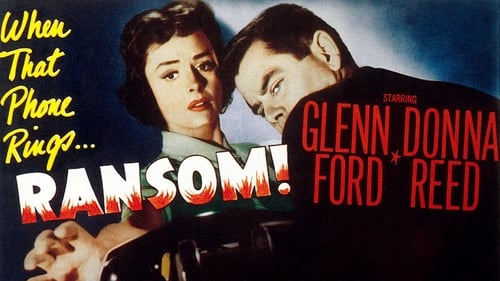




Excellent, a Must See
All of these films share one commonality, that being a kind of emotional center that humanizes a cast of monsters.
View MoreIt really made me laugh, but for some moments I was tearing up because I could relate so much.
View MoreA terrific literary drama and character piece that shows how the process of creating art can be seen differently by those doing it and those looking at it from the outside.
View MoreGlenn Ford and Donna Reed star in this story of a prominent rich family, because the father's in the vacuum cleaner business, making them, not selling. Because he's in the public eye and rich, his son is ripe for the taking, anyone might think. And, they can get quite a big ransom for the boy. Think again. Glenn Ford's just a little smarter than your average dad, or maybe crazier. He decides not only to not pay the ransom, half a million dollars, but instead is putting it on the head of the abductor and in effect turns the tables on him. The film starts out well and is at best a very emotional roller-coaster ride, as both Donna and Glenn break down. Donna Reed is especially good, and gives a memorable performance in one scene in particular, as she is remembering the day her baby was born. But the climax of the film is seeing Glenn Ford, live on a television broadcast, vowing to get his enemy no matter the cost. From there, the film, quite frankly, drags. The film's main attribute is the acting, as some of the dialogue throughout is awkward and unrealistic. The fact that he doesn't pay the ransom and his speech are the most distinctive things about the picture. In fact, I'm surprised they made a full film about it, because essentially there was no story to really tell. Leslie Nielsen makes his screen debut as a nosy and pushy reporter who wants a scoop. The Mel Gibson remake had a stronger ending, but at the same time makes the viewer feel as if, is this really appropriate? All in all, if you are curious about the original "Ransom," I would recommend it to see the stars in some strong acting performances, but this film is really a one-time deal.
View MoreGlenn Ford has always struck me as having a lot in common with his (unrelated) modern-day namesake Harrison Ford. Both were good at playing calm, unflappable heroes and at conveying a sense of solidity and inner decency which made them valuable as the heroes of thrillers, especially crime thrillers. In "Ransom!", as in the classic film noir "The Big Heat" which he made three years earlier, Glenn Ford plays an ordinary man whose life is suddenly turned upside down by the activities of a criminal gang. His character in "Ransom!" is Dave Stannard, a wealthy businessman. The Christian name may be a reference to the earlier film, in which his character was also named Dave, and the surname may be a play on the word "standard". (The pronunciation of the two words would be closer in American English than in Britain, where the first "d" in "standard" would be fully voiced). The Stannard family are very much the standard well-to-do white all-American family as portrayed in the media during the fifties- hard-working, caring dad, attractive mom, cheeky but lovable young son and faithful old black servant. The crisis in the family's life comes when their son Andy is kidnapped and the kidnappers demand a ransom of $500,000. In response, Dave takes an unexpected step. He is informed by the local police chief that, statistically, it will make no difference to his son's chances of survival whether he pays the ransom or not. He therefore decides that it is his duty not to pay the ransom, as to do so will only encourage other criminals to carry out kidnappings. He therefore makes a live television broadcast in which he offers the $500,000 as a reward for the capture of the kidnappers. The film was remade by Ron Howard in the 1990s with Mel Gibson in the leading role. Although Howard keeps the basic premise of the original film, the treatment of the subject is so different that a direct comparison would probably be unfair. The 1956 film has its strengths, particularly Ford's performance, but it also has three main weaknesses. The first of these is the portrayal of Dave's wife Edith as weak and hysterical, although the fault here lies with the scriptwriters rather than with Donna Reed. The second major weakness in the film is that it is too static. It contains surprisingly little in the way of physical action for a crime drama, even by the standards of the fifties. (There was, for example, considerably more action in "The Big Heat"). In some ways it is a rather old- fashioned film, looking back to the studio-bound "filmed theatre" style of the thirties and forties, in which most scenes took place indoors and dialogue was more important than physical action. Here, most of the action takes place in the Stannards' living room as Dave debates what action he should take with the local police chief, his brother Al, Charlie Telfer, a journalist covering the story, and even his butler "Uncle Jesse". (As Edith spends most of the film unconscious, having been sedated by the family doctor, she misses out on a lot of these discussions). The film's third main flaw is that we never see the kidnappers or even learn their identities. We therefore never know why, at the end of the film, they release Andy unharmed. (The main reason is presumably that studio bosses wanted a happy ending). This means that, essentially, we miss out on half the story. The psychological pressures on Dave and Edith, and the ethical considerations which lead him to offer a reward rather than paying a ransom, are only the first half. We also want to know the second half of the story- the psychological pressures on the criminals themselves, and how those pressures are increased by the fact that Dave has put a bounty on their heads. The film also avoids some of the ethical issues raised by Dave's decision. It seems, for example, unlikely that his bounty will ever be claimed unless one or more members of the gang turn State's evidence and inform on the others- which means that at least one of the kidnappers will end up being rewarded for the crime. "Ransom!" raises some potentially interesting issues, but does not treat them fully, and ends up as no more than a bog-standard (or bog-Stannard) crime drama. 5/10
View MoreRansom is emblematic of the little, B&W films of the 50s that made up for their low budgets with high mindedness. In a similar context, it reminds me of Twelve Angry Men, made the following year. Both films expanded a profound human dilemma (how to resolve a kidnapping in one case, how to judge the guilt or innocence of a man regardless of popular consensus in another) into a cinematic drama that leaves a greater imprint on your mind than the slam-boom special-effect films of today can possibly accomplish. You leave the theater (or your home TV) thinking over and over, "What would I have done if I were in that situation?" Because of the kiddie-market mentality of modern film producers and the international demand for plots that are high in action and low in thought content, we will never see films of this kind being produced again (at least not by the majors). Savor this film and others like it.
View MoreThere certainly seem to be very mixed perceptions of this film posted here by the various reviewers. It is perhaps the film's greatest strength that it does manage to entertain despite some serious flaws. Indeed, my family and I enjoy this film very much, perhaps because there is so much wrong with it that generates discussion.For starters, I'll address "realism". The depiction of the Stannard family is no more realistic than the Cleavers, the Nelsons, or any other exceedingly unbelievably perfect white upper-middle-class family that would be depicted on 1950's television; that is to say, there is no such animal as this, then or now. At the beginning of the story, the Stannard's grade-school age boy has been going about the house destroying the furniture to salvage wood for his backyard clubhouse, and for this he receives nothing more than a lighthearted and very amused reprimand from his father. This is realism? Had the story continued on dealing only with the perfect family life of the perfect Stannards, it would have been intolerable.But, as you know, their boy is kidnapped. Unlike Ron Howard's rather inferior remake, this original screenplay never attempts to tell us who kidnapped the child or what their motivation might have been. Rather than a plot hole, this serves to increase the anxiety we share with the family, as these are questions they have no answers to either. And it's really rather irrelevant. The Stannard's live quite well, even by unrealistic 1950's white TV family standards, the potential money alone is all the motivation required for a kidnapping.It is at this point in the film that we crash headlong into its biggest flaw. The treatment of Donna Reed's character, Mrs. Stannard, is deplorable, even in a time period when women were routinely portrayed as little more than drooling idiots. Seemingly greater than the concern for the kidnapped child is the concern that his mother might suffer an unchecked display of emotion. Indeed, the doctor has been summoned with his narcotics and she is promptly doped up even before the police have arrived! The only excuse offered for this disturbingly abusive misogynistic behavior is that "she carried that child in her body" and the father did not. Good Lord! As Mrs. Stannard remains in a drugged stupor for the remainder of the film, from this point on her character becomes little more than an annoying distraction. This portrayal of women as childish morons who cannot handle their own emotions is both shockingly sexist and insulting. Why is it that almost no one would pass up an opportunity to denigrate the portrayal of African Americans or Hispanics in old films, yet this treatment of women rarely rates a mention? I certainly hope this is not realism, as I should hope the family's seeming inability to bar unwanted tabloid vultures from the privacy of their own home is not considered "realism" either. The police were on hand, they could have handily ejected such unwelcome nuisances at any time with a mere request from the one remaining coherent parent.Once we get past some of this freakishly surrealistic activity, the meat of the story does tackle some intriguing questions, and does make some attempt to deal with the family's anguish as well as the father's bold decision not to cave into the fear inflicted upon them by the kidnappers. Ultimately, it is these thought provoking larger issues that give the film it's value, as the Stannard's particular kidnapping seems to be suddenly resolved with no explanation whatsoever.This is an entertaining film, relatively safe family viewing (if you don't mind explaining to your kids why they shot mommy full of dope at the drop of a hat), and should certainly generate some lively discussion.
View More